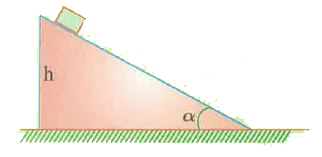An object of mass m slides down a hill of arbitrary shape and after travelling a certain horizontal path stops because of friction. The total vertical height descended is h. The friction coefficient is different for different segments for the entire path but is independent of the velocity and direction of motion. The work that a tangerial force must perform to return the object to its initial position along the same path is
mgh
2 mgh
4 mgh
−mgh
The correct Answer is:B
Step by step video, text & image solution for An object of mass m slides down a hill of arbitrary shape and after travelling a certain horizontal path stops because of friction. The total vertical height descended is h. The friction coefficient is different for different segments for the entire path but is independent of the velocity and direction of motion. The work that a tangerial force must perform to return the object to its initial position along the same path is by Physics experts to help you in doubts & scoring excellent marks in Class 11 exams.
Topper's Solved these Questions
- BOOK - PHYSICS GALAXY - ASHISH ARORACHAPTER - WORK, ENERGY AND POWEREXERCISE - unsolvedMCQ78videos
WORK, ENERGY AND POWER
- BOOK - PHYSICS GALAXY - ASHISH ARORACHAPTER - WORK, ENERGY AND POWEREXERCISE - unsolved1videos
WORK, ENERGY AND POWER
- BOOK - PHYSICS GALAXY - ASHISH ARORACHAPTER - WORK, ENERGY AND POWEREXERCISE - Discussion Question31videos
WORK, ENERGY AND POWER
- BOOK - PHYSICS GALAXY - ASHISH ARORACHAPTER - RIGID BODIES AND ROTATIONAL MOTIONEXERCISE - Unsolved Numerical63videos
RIGID BODIES AND ROTATIONAL MOTION
Similar Questions
What is the ratio of displacement to the path length traversed by an object, if the object comes back to its initial position?
View SolutionA mass m slides down a fixed plane inclined at an angle a to the horizontal plane after covering the entire length of the inclined plane. The height of the inclined plane is h and the coefficient of friction over both surfaces is μ.
 View Solution
View Solution
Knowledge Check
- Question 1 - Select One
An object of mass m slides down a hill of height h and of arbitrary shape and stops at the bottom because of friction. The coefficient of friction may be different for different segments of the path. Work required to return the object to its position along the same path by a tangential force is
AmghB2mghC=−mghDit can not be calculated - Question 2 - Select One
For a particle moving in vertical circle, the total energy at different positions along the path
Ais conservedBincreasesCdecreasesDmay increases or decreases - Question 3 - Select One
A car travels east with a certain constant velocity. The direction of the friction force on the car is
Adue eastBdue westCupDzero
Represent the motion of an object in unifrom motion along a straight line when both initial distance and velocity of the object is positive .
View SolutionA block of mass m is given velocity v0 on a rough horizontal surface. After traveling a distance d. Its speed becomes (v0)/(2). Find the work done against friction. The work donw by friction and the coefficient of friction.
View SolutionA brick of mass 2kg begins to slide down on a plane inclined at an angle of 45∘ with the horizontal. The force of friction will be
View SolutionA brick of mass 2kg just begins to slide down on inclined plane at an angle of 45∘ with the horizontal. The force of friction will be
View SolutionAn object of mass (m) is located on the horizontal plane at the origin O. The body acquires horizontal velocity V. The mean power developed by the frictional force during the whole time of motion is ( μ= frictional coefficient )
View Solution

